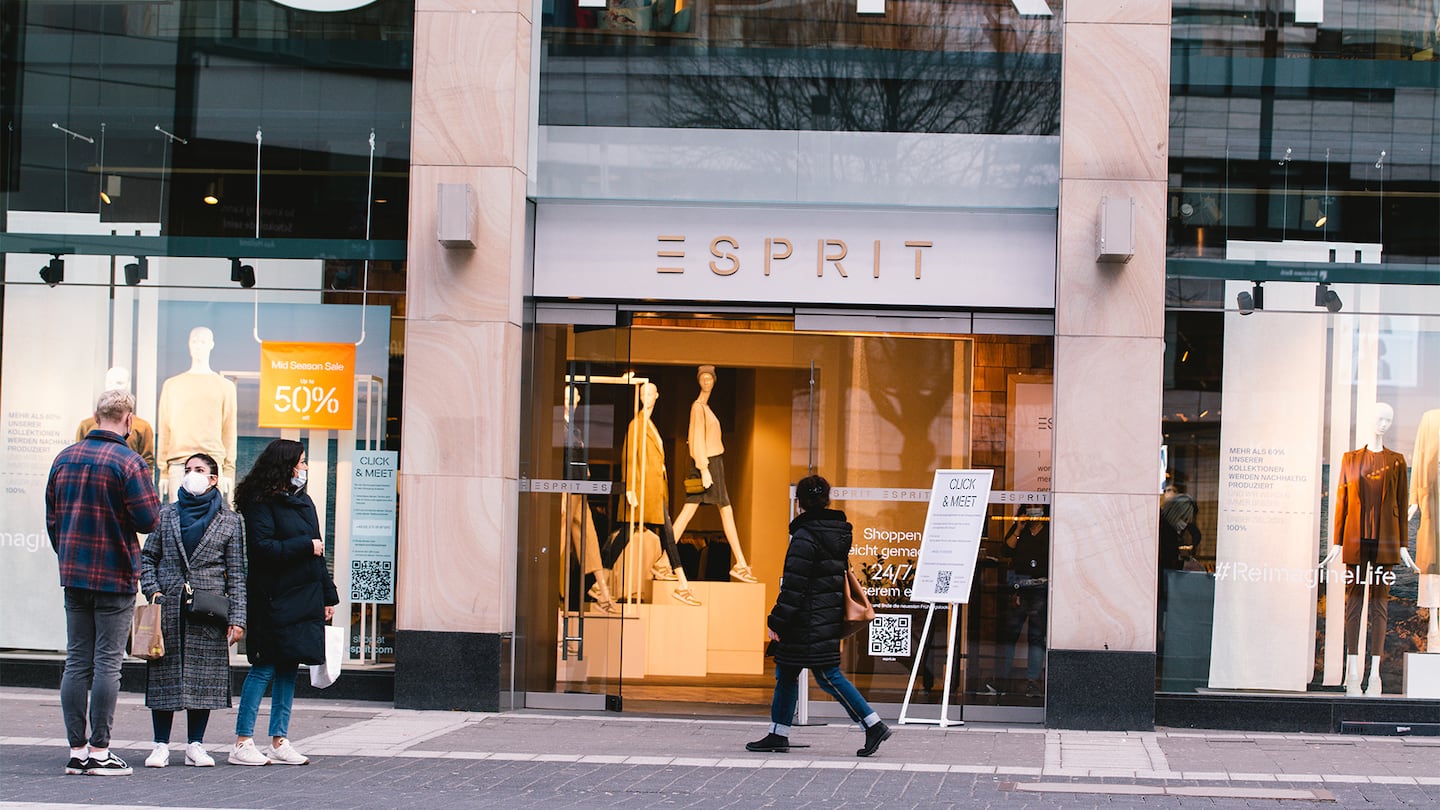The Business of Fashion
Agenda-setting intelligence, analysis and advice for the global fashion community.
Agenda-setting intelligence, analysis and advice for the global fashion community.

Esprit is closing stores and laying off staff in its US division as a global rebranding campaign appears to have faltered, The Business of Fashion has learned.
The company, which is publicly traded in Hong Kong but majority owned by a group of investors based in the city, said Wednesday it is in talks with potential investors to help the brand carry on with restructuring efforts.
Earlier this month, Esprit filed for insolvency for its Belgian and Swiss subsidiaries. Five stores in the US and Canada, all opened in the last two years, are slated to close later this year and 18 corporate employees on the New York-based creative team have been laid off, people familiar with the matter told BoF. Multiple vendors have been waiting months to be paid.
The company told BoF Thursday it is continuing with “restructuring and repositioning” initiatives in the US. Its new stores were always meant to be pop-ups, Esprit said in an email statement, and it plans to open additional outposts in North America.
ADVERTISEMENT
“The company has recently engaged in numerous restructuring efforts to return to sustainable growth,” Esprit said in the statement. “These efforts unfortunately necessitated a reduction in positions in the New York office in order to right-size operations.”
An upcoming deal would be Esprit’s second rescue in four years. In 2020, the company filed for bankruptcy and closed its stores in Germany. Later that year, it was acquired by a group of private investors in Hong Kong.
The immediate cause of Esprit’s current troubles appears to be the meagre returns of an initiative that was designed to resuscitate the brand, which was launched in 1968 by The North Face founder Doug Tompkins and his wife, Susie Tompkins. Esprit still has global name recognition but is many years removed from its 1980s heyday, when its signature neon colours and androgynous styles helped set the tone for the decade. By the 2010s, its US presence had dwindled, though it continued to operate stores across Asia and in Europe, its biggest market.
In 2022, Esprit began gearing up for a global marketing campaign, which was paired with events and cultural activations; wholesale expansion in North America, opening the first new stores of its own on the continent years; and new collections that embraced Esprit’s original codes: bold prints, bright colours and hoodies bearing the brand’s sans serif logo. Ana Andjelic, the marketing whiz who had previously set in motion a similar revamp at Banana Republic, joined Esprit to head the US portion of the rebranding project in late 2022.
So far, consumers have not responded to the new Esprit. Sales, which had been falling steadily for years, accelerated their slide. Global revenue in 2023 totalled HK$5.9 billion ($753 million), down by almost half from before the pandemic. Esprit last turned a profit in 2021; its operating loss last year was HK$2.5 billion ($320 million).
Andjelic left in March, and a New York-based creative team she headed was downsized significantly, former employees say.
Successful rebrandings are difficult and can take years to translate into higher sales. Resuscitating a label that’s been struggling as long as Esprit is even more challenging. For every Abercrombie & Fitch, there are more examples like Brooks Brothers and Express, Inc., mid-tier retailers that have fallen by the wayside in the last decade as consumers opt for more culturally relevant options.
Nathan Haigh, a fashion director at Esprit between 2022 and 2023 based in London, said the efforts may have been too ambitious from the beginning. He said Andjelic’s creative vision ultimately failed to resonate.
ADVERTISEMENT
“It was almost like they were trying to do too much at once,” said Haigh. “Nothing was really ever developed or pushed out.”
Several former employees characterised Esprit’s latest attempt to reinvent itself as misguided from the start, and marred by impatient and inexperienced leadership. Multiple former employees said CEO William Pak, whose background is in corporate law, and the company’s ownership had an aggressive timetable for the rebranding, as they were planning to sell the revived version of Esprit to other investors. They were reportedly in talks with Chinese sporting giant Anta, sources said, but a deal ultimately failed to materialise.
“The company was bought by operators with no experience in retail,” said one former executive based in Hong Kong.
“The owners were impatient to grow and when it didn’t arrive, and once the money didn’t come, they weren’t prepared to continue funding the business because there were too many … structural elements that were hard to change.”
For storied but faded labels, reissuing archival styles with modern twists is the easy part. Long-term revival requires intensive internal reorganisation.
The company is now focusing on better-quality clothing that’s more expensive than fast-fashion apparel but more sustainable, Chief Executive William Pak said in an interview with Bloomberg Television on Monday.
HONG KONG, China — Esprit Holdings Ltd., the clothing retailer rebuilding its brand, forecast a return to profit in the six months ended December

Cathaleen Chen is Retail Correspondent at The Business of Fashion. She is based in New York and drives BoF’s coverage of the retail and direct-to-consumer sectors.
Nordstrom, Tod’s and L’Occitane are all pushing for privatisation. Ultimately, their fate will not be determined by whether they are under the scrutiny of public investors.
The humble trainer, once the reserve of football fans, Britpop kids and the odd skateboarder, has become as ubiquitous as battered Converse All Stars in the 00s indie sleaze years.
Manhattanites had little love for the $25 billion megaproject when it opened five years ago (the pandemic lockdowns didn't help, either). But a constantly shifting mix of stores, restaurants and experiences is now drawing large numbers of both locals and tourists.
BoF Careers provides essential sector insights for fashion professionals in retail this month, to help you decode fashion’s retail landscape.